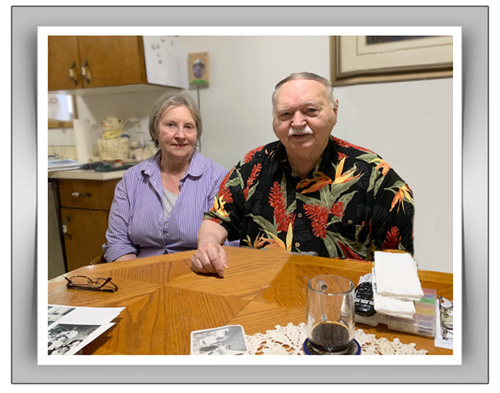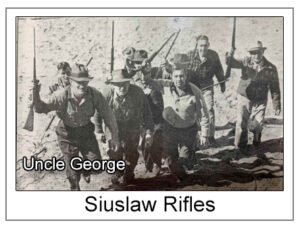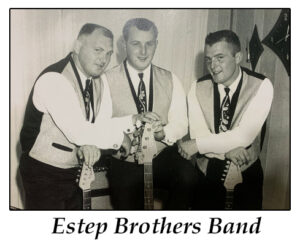Ron and Bev Estep
Oral History Project

Their families may likely have traveled the same route generations before, as both ventured west by wagon train on the Applegate trail. However, it wasn’t until many years later their paths would actually cross.
Beverly Plaep Estep has lived her entire life in Oregon. Her paternal grandparents Fred and Henrietta Plaep were originally from Germany (E. Prussia). At 18, Fred worked as a deck hand for 6 years aboard sailing ships travelling to South America, Japan, Cape Horn, New York, and finally the West Coast, settling in Coos Bay. He learned English by studying the Sears Roebuck catalogue.
In 1923, the family bought a farm on Bear Creek in Ada. Their cattle were raised and butchered for crews of the railroad camps who were building a tunnel for Southern Pacific railroad. The farm’s eggs were also sold to them. Milk from the dairy cows was separated and the cream made into butter to be sold in town for 50 cents a pound. The cream and milk were also sent by train from the Canary depot to Eugene, then south to San Francisco. Trees on the property were cut and the lumber used to build barns, fences and small bridges for cows and horse drawn wagons to cross the farm’s streams.
Bev’s father Henry attended Fiddle Creek School, a one-room structure with a wood stove in the back, and an outhouse a short distance away. About 20 children attended school during the years the railroad and tunnel were being built. However once the railroad was completed, only a few local families with school children remained. As the years passed, Henry and George relocated to Florence while the other seven children settled in Reedsport, McMinnville and Portland. In 1958 the farm was sold and Fred and Henrietta moved to Florence.
Tragically, in 1959 grandpa Fred Plaep died of a heart attack while on a hunting trip in Bend with his two sons.
 Following the Pearl Harbor attack on December 7, 1941, there was widespread fear of a possible attack by the Japanese along the Pacific Coast. Local volunteers formed paramilitary groups to protect the coastal areas. Bev’s Uncle George joined the Siuslaw Rifles (known locally as the Vine Maple Savages), and for two years participated in drills and training exercises as a coastal defense. They performed beach patrols and stood guard on bridges along Highway 101 and the Cape Creek tunnel, north of Florence. They were issued no equipment and resorted to furnishing their own weapons (squirrel guns and hunting rifles). In the Spring of 1942, the Oregon State Guard was established, and many of the VMS transitioned to that unit. They were issued a cap and shoulder patch, attended drills, but their status remained as volunteers with no monetary compensation (most held regular jobs for employment), and continued to provide their own guns and ammunition.
Following the Pearl Harbor attack on December 7, 1941, there was widespread fear of a possible attack by the Japanese along the Pacific Coast. Local volunteers formed paramilitary groups to protect the coastal areas. Bev’s Uncle George joined the Siuslaw Rifles (known locally as the Vine Maple Savages), and for two years participated in drills and training exercises as a coastal defense. They performed beach patrols and stood guard on bridges along Highway 101 and the Cape Creek tunnel, north of Florence. They were issued no equipment and resorted to furnishing their own weapons (squirrel guns and hunting rifles). In the Spring of 1942, the Oregon State Guard was established, and many of the VMS transitioned to that unit. They were issued a cap and shoulder patch, attended drills, but their status remained as volunteers with no monetary compensation (most held regular jobs for employment), and continued to provide their own guns and ammunition.
The Three C’s (Project SP-10, CO #1213)
The Civilian Conservation Corps (“CCC”) program began in 1933 during President Franklin Roosevelt’s administration and was run by the U.S. Army. It was a public relief program employing young men 17 to 25 years old. The project built park trails, rock walls, planted trees, maintained roads, installed telephone lines, fought fires, and was responsible for a number of other projects on public lands in Florence and Oregon Forests. Some CCC projects in our area include Jessie M. Honeyman Memorial State Park, Camp Cleawox, Oregon Dunes National Recreation Area, Siuslaw National Forest, and Cape Perpetua (Lincoln County). It is said the CCC planted nearly 3 billion trees during its existence. In 1942, attention turned to the WWII effort and Congress voted to disband the CCC program.
Ron Estep’s father Donald was born in Oregon in 1919, in the Alpine/Springfield area. He was raised in Portland, and joined the CCC in his late teens . He was assigned to work on the Oregon Coast in the Otter Rock area, between Depoe Bay and Newport. He married Dorothy McFarland in Vancouver, WA in 1936. Their son Ron was born in 1938 and Don, Jr. was born the following year. According to the 1940 U.S. Census, Don was a timber faller in Portland while working for the Works Progress Administration (“WPA”). A third son, Dick was born in 1943. Don also worked in the Swan Island shipyards for a few years before moving the family to Siletz in about 1945 where he again worked as a timber faller.
Some years later, the family purchased a 200-acre ranch with their grandparents, outside of Oregon City. They raised cattle, pigs and rabbits. During the season, Ron’s father cut and sold Christmas trees grown on the property. Five miles away from the ranch, Ron and his brother attended a one-room schoolhouse. He remembers being in the sixth grade then, because students were seated in rows according to grade level, and Ron was assigned to the sixth row.
After a number of years, they sold the farm and moved back to Portland for a brief time while Don worked in a plywood mill. During a vacation to Florence in 1949, the Estep family visited with friends living at the former Woahink CCC camp. By the end of the vacation, Don was offered a job by a logging company. They returned to Portland to pack up their things and returned to Florence to begin living at the CCC camp in Woahink.
By that time, the Woahink camp had become privately owned. Ron recalls about 18 to 20 barracks were converted to homes. His family resided in the former infirmary structure. A neighbor lived in what had once served as the camp’s commissary. It was discovered to have an old barber chair stored in the back. As it turns out, the discovery proved convenient, as Ron remembers many of the kids at the camp received their haircuts from that neighbor. It was at the CCC camp where Ron’s father taught him 3 chords on a 4-string banjo ukulele which began Ron’s life-long love and passion for playing music.
 Ron and his brothers played music together during their school years and their band was well known around town as “The Estep Brothers”. They performed throughout the state for school and college events, festivals, the Elk and Moose lodges, and later, in nightclubs. They made television and radio appearances as well. In 1963 their original songs of “Linda Sue” and “Leave Me Alone” were recorded on vinyl. Years later, Ron’s brothers moved to separate towns for other career opportunities, but still enjoyed making music together at family get togethers.
Ron and his brothers played music together during their school years and their band was well known around town as “The Estep Brothers”. They performed throughout the state for school and college events, festivals, the Elk and Moose lodges, and later, in nightclubs. They made television and radio appearances as well. In 1963 their original songs of “Linda Sue” and “Leave Me Alone” were recorded on vinyl. Years later, Ron’s brothers moved to separate towns for other career opportunities, but still enjoyed making music together at family get togethers.
In Florence, Ron continued with his music, joining other bands throughout the years – the Montegos, Persuaders and New Folksters, performing at local venues on Bay Street (Fisherman’s Wharf), Pier Point Inn, Moose Lodge, Drift Inn, the Winter Folk Festival and in Eugene. They did benefit appearances for Shorewood, Spruce Point, the Memory Care Center, Relay for Life, and the Siuslaw Pioneer Museum.
Ron’s School Years and Career
Ron’s schoolmates at Siuslaw High School were related to the Plaep family and he saw them often. It was during those years that he remembers first meeting a then 9-year old Bev Plaep. However, it wasn’t until many years later when she attended one of his band performances that they became acquainted. Not long after, they were married.
Ron worked for U.S. Plywood (later named Champion International) in Mapleton. In the mid 1960’s, he joined the National Guard and trained in Infantry at Fort Ord, before transferring to an armored battalion unit in Coos Bay. He achieved the rank of a Sergeant E3.
With a growing interest in technology and the micro-processing field, Ron attended classes and graduated from SWOCC with an Associate of Science degree in computer science. In 1978 he opened Siuslaw Electronics, a television repair shop in Florence. A few years later, his career took another turn when he accepted a position with Intel Corporation in Portland, and remained there for 20 years. In 1999, he and Bev returned to Florence where he worked at Oregon Pacific Bank until he retired. Bev worked at Dr. Hunt’s dental office for 15 years before she too retired.
Ron and Bev recently celebrated their 50th wedding anniversary in a cabin (rented for them by their sons) on Woahink Lake, across from the CCC camp location where Ron grew up. Ron and Bev Estep’s history in Florence are deeply rooted. Though career opportunities took them away from Florence for a time, they always returned for family vacations and visits. All the while, the town remained in their hearts as ‘home’. At the first opportunity, they returned to Florence to join family, reconnect with old friends from high school and make it their permanent home. Just as their parents had done, their sons who no longer live in Florence, have fond memories of the past and continue to return to enjoy the town where they were born and began their early school years.
It was a privilege to be present as Ron and Bev shared their memories and experiences.
